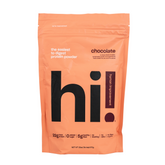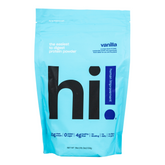When you hear “creatine,” you probably picture protein shakes and personal records. But there's much more to this molecule than muscle. Behind the scenes, creatine is playing a vital role in one of your body’s most complex and energy-hungry organs: the brain.
More and more research is revealing that creatine isn't just a performance supplement — it's a cognitive one, too. It supports mental clarity, emotional resilience, and long-term brain health by fueling cellular energy where it's needed most.
We're going to break down the science behind creatine’s impact on brain energy, mental clarity, mood regulation, and its potential role in reducing Alzheimer’s risk — and why it might be just as essential for your mind as it is for your muscles.
🧠 1. Creatine Fuels Brain Energy
Your brain accounts for only 2% of your body weight, yet it consumes up to 20% of your total energy. That energy is stored and delivered in the form of ATP — your cells’ fuel source for thinking, reacting, processing, and regenerating.
Creatine acts like a cellular battery charger. It helps recycle ATP quickly, especially during moments of high cognitive demand, like deep concentration, problem-solving, or decision-making.
The research: In a double-blind, placebo-controlled trial, creatine supplementation led to improved cognitive performance and reduced mental fatigue during complex tasks, particularly under sleep-deprived conditions.1
💡 “Creatine helps your brain stay sharp by keeping its energy systems fully charged.”
⚡ 2. Creatine Reduces Mental Fatigue and Boosts Cognitive Performance
Mental fatigue isn’t just about feeling tired — it’s when your neurons struggle to meet the energy demand of ongoing thinking, planning, or learning. And it can affect anyone: students, professionals, parents, and even high performers.
Creatine helps buffer against cognitive burnout by supporting mitochondrial function, preserving neuron communication, and maintaining metabolic efficiency in the brain.2
✔️ Longer focus sessions
✔️ Faster recovery from mental exhaustion
✔️ Sharper memory and quicker recall under stress
⚠️ Mental clarity isn’t just about mindset — it’s about cellular energy. Creatine helps restore it.
🌤️ 3. Creatine and Mood: A Surprising Connection
Mood disorders like depression and anxiety are now being understood as metabolic conditions — and energy imbalance in the brain may play a larger role than we once thought.
Because creatine helps restore ATP and supports neurotransmitter production (like serotonin and dopamine), it’s been studied as a supportive therapy for depression.
🔬 What the Research Shows:
- A 2007 study found that women with major depressive disorder who took 5g/day of creatine alongside an SSRI experienced faster and greater improvements in mood than those using the antidepressant alone.3
- In adolescents with treatment-resistant depression, creatine supplementation boosted the efficacy of SSRIs, particularly in the first 2–4 weeks.4
- Brain scans using ¹H-MRS have shown reduced creatine levels in the amygdala and prefrontal cortex of people with major depression.5
🧠 “Creatine is emerging as a metabolic ally in mental health care — not just for muscles, but for minds.”
Who might benefit:
✔️ People experiencing low mood or burnout
✔️ Those with treatment-resistant depression (as an adjunct)
✔️ Anyone under high mental and emotional stress
🌿 Creatine isn’t a cure, but it’s a compelling support for the brain’s energy-hungry emotional centers.
🧠 4. Creatine & Alzheimer’s: Early Clinical Evidence for Cognitive Support
Alzheimer’s disease is marked by declining brain energy metabolism, oxidative stress, and mitochondrial dysfunction — all areas where creatine plays a critical role. Until recently, creatine’s neuroprotective potential had only been observed in animal models. That changed with a new 2025 human pilot study.
Published in Alzheimer’s & Dementia: Translational Research & Clinical Interventions, the study investigated the effects of 8 weeks of high-dose creatine monohydrate (20g/day) in 20 patients with clinically diagnosed Alzheimer’s disease. The results were encouraging to say the least.
🔬 What the Study Found:
- Brain creatine levels increased by 11%, confirming that taking creatine orally successfully reached and impacted the brain.
-
Cognition improved across multiple categories, including:
- Better short-term memory: Study participants were 12% better at holding and organizing information in their mind
- Improved reading skills: They read and recognized words 5% more accurately
- Sharper thinking: Problem-solving and mental flexibility improved by over 7%
- Overall total cognitive scores increased by more than 4%
- Participants were 7% better at staying focused and ignoring distractions
- Cognitive gains correlated strongly with increases in brain creatine, especially reading performance6
90% of participants were amyloid-positive, and 65% carried the APOE4 gene — both markers of advanced Alzheimer’s risk.
🧪 Why This Matters
This study provides the first clinical evidence that creatine monohydrate supplementation is not only feasible but potentially beneficial for cognitive preservation in Alzheimer’s.
These results align with years of preclinical research showing:
- Reduced amyloid and tau buildup
- Improved mitochondrial function
- Better memory and learning performance in AD mouse models
While more large-scale, placebo-controlled trials are needed, creatine is showing real promise as a low-risk, low-cost intervention for supporting cognitive health in aging and Alzheimer’s. It’s not just about muscle — it’s about mitochondria, memory, and mental resilience.
👥 5. Who Should Consider Creatine for Cognitive Health?
While most of what you have probably heard in the past about creatine targets fitness enthusiasts, creatine’s cognitive benefits are also great for:
- Students facing intense study loads
- Professionals dealing with burnout and brain fog
- Older adults looking to protect memory and brain function
- People with low mood or chronic fatigue
It’s safe, well-researched, and increasingly recommended as part of a modern nootropic stack — especially when mental performance and resilience matter most.
🔬 6. Our Take
At Human Improvement, we create products that support total human health — not just for physical strength, but for cognitive strength, cellular vitality, and long-term well-being.
That’s why we developed Performance Creatine - ultra-pure, micronized creatine monohydrate, rigorously 3rd party tested for quality and effectiveness.
Backed by decades of research, it’s one of the safest and most effective supplements for performance, energy, cognition, and cellular health.
But we didn't stop there. we added MAX Catalyst, a piperine extract scientifically proven to enhance absorption by over 80% - delivering greater strength, sharper focus, and even more human improvement from every scoop.
Shop Performance Creatine here.
📚 Want to learn more about creatine?
- 👉 Creatine 101: Everything You Ever Wanted to Know...And More
- 👉 5 Benefits of Creatine That Have Nothing to Do With the Gym
- 👉 How Creatine Supports Cellular Health
- 👉 Can Creatine Help You Sleep Better?
- 👉 Creatine for Healthy Aging
🔎 References
- Rae, C. et al. (2003). Oral creatine supplementation improves brain performance. Proc Biol Sci, 270(1529), 2147–2150.
- McMorris, T. et al. (2007). Creatine supplementation and cognitive performance in the elderly. Psychopharmacology, 195(3), 397–403.
- Roitman, S. et al. (2007). Creatine monohydrate in resistant depression: a preliminary study. J Clin Psychiatry, 68(6), 938–940.
- Kondo, D. G. et al. (2011). Treatment of adolescent depression with creatine monohydrate: a pilot study. J Clin Psychopharmacol, 31(5), 642–644.
- Lyoo, I. K. et al. (2003). Decreased creatine levels in the left amygdala of patients with major depressive disorder. Biol Psychiatry, 54(4), 437–443.
- Smith, A. N. et al. (2025). Creatine monohydrate pilot in Alzheimer’s: Feasibility, brain creatine, and cognition. Alzheimer’s & Dementia: Translational Research & Clinical Interventions, 11, e70101. Read the full study here.









